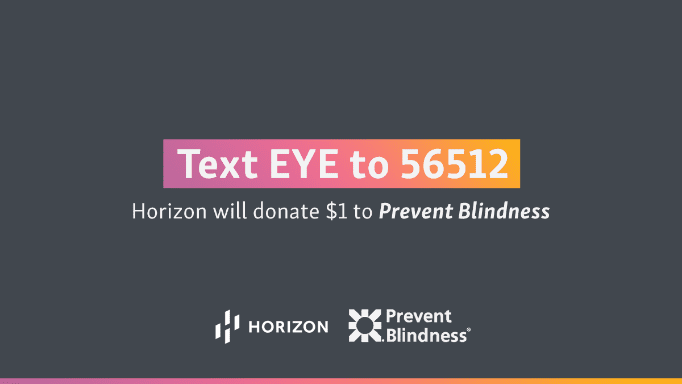Today, in support of World Sight Day, Horizon Therapeutics plc (Nasdaq: HZNP) and Prevent Blindness launched a campaign that brings together the voices of the thyroid eye disease (TED) community to educate the public on how TED can damage vision and encourage people who are living with TED to put their vision first by sharing their experiences, monitoring their symptoms and finding the right doctor. World Sight Day is an internationally recognized awareness day designed to focus attention on blindness and vision impairment. This year’s dialogue emphasizes “Vision First,” with a call to the community to make vision a priority.

Now through Oct. 31, 2019, Horizon will donate $1 (up to $10,000) to Prevent Blindness every time someone texts “EYE” to 56512. The campaign also invites the TED community to share how they have seen TED affect vision – whether it be from experiencing it personally, or watching a friend, loved one or patient endure it. Select stories will be compiled and shared on social media to help people who are living with TED, healthcare professionals and the general public better understand the disease. Spotting the signs and symptoms of TED early can help decrease the chances of permanent eye damage. People who are at risk for TED, including those with Graves’ disease, are encouraged to pay attention to changes in their eyes – such as pain, redness, light sensitivity, bulging, blurry vision and double vision – and visit an ophthalmologist or oculoplastic surgeon to get an eye exam.
“According to the World Health Organization, approximately 80 percent of all vision impairment across the globe is considered avoidable – this statistic is both shocking and unacceptable,” said Jeff Todd, president and CEO, Prevent Blindness. “As a part of our sight-saving mission, we are thrilled to partner with Horizon to raise awareness about TED and inspire patients to actively monitor and successfully manage their symptoms.”
TED is a serious, progressive and vision-threatening autoimmune disease (1,2). TED begins with active TED that may last for up to three years, after which damage to the eyes can be irreversible (1,3). Common symptoms include light sensitivity, eye grittiness, bulging eyes and double vision, among others – all of which can reduce a person’s independence, ability to work and self-confidence (1,4). As TED progresses, it can cause long-term, irreversible damage. Effective management of TED requires early diagnosis and active monitoring to identify the best opportunity for medical intervention (1). Patients who suspect that they may have TED should visit an eye specialist, such as an ophthalmologist or oculoplastic surgeon, to have their eyes examined. To learn more about TED, visit the new Prevent Blindness web resource and visit www.ThyroidEyes.com to sign up to receive information about TED.
“At Horizon, we’ve made it our priority to better understand the needs of the TED community,” said Matt Flesch, vice president, communications and patient advocacy, Horizon. “Through conversations with patients, caregivers and healthcare professionals, we’ve heard how this disease can impair vision – making it difficult to do the things we often take for granted, like drive, walk up or down stairs alone and read. By working together with Prevent Blindness, we hope to multiply our efforts and reach even more people with the TED education and support they need to speak up and be good advocates for their eye health.”
To learn more about World Sight Day and other ways to get involved, visit the website for The International Agency for the Prevention of Blindness.
About Prevent Blindness
Founded in 1908, Prevent Blindness is the nation’s leading volunteer eye health and safety organization dedicated to fighting blindness and saving sight. Focused on promoting a continuum of vision care, Prevent Blindness touches the lives of millions of people each year through public and professional education, advocacy, certified vision screening and training, community and patient service programs and research. These services are made possible through the generous support of the American public. Together with a network of affiliates, Prevent Blindness is committed to eliminating preventable blindness in America. For more information, or to make a contribution to the sight-saving fund, call 1-800-331-2020. Or, visit us on the Web at preventblindness.org or facebook.com/preventblindness.
About Horizon
Horizon is focused on researching, developing and commercializing medicines that address critical needs for people impacted by rare and rheumatic diseases. Our pipeline is purposeful: we apply scientific expertise and courage to bring clinically meaningful therapies to patients. We believe science and compassion must work together to transform lives. For more information on how we go to incredible lengths to impact lives, please visit www.horizontherapeutics.com, follow us @HorizonNews on Twitter, like us on Facebook or explore career opportunities on LinkedIn.
References
-
- Barrio-Barrio J, Sabater AL, Bonet-Farriol E, Velazquez-Villoria A, Galofre JC. Graves’ Ophthalmopathy: VISA versus EUGOGO Classification, Assessment, and Management. Journal of Ophthalmology. 2015:1-16.
-
- Bartalena L, Baldeschi L, Boboridis K, Eckstein A, Kahaly GJ, Marcocci C, Perros P, Salvi M, Wiersinga WM. The 2016 European Thyroid Association/European Group on Graves’ Orbitopathy Guidelines for the Management of Graves’ Orbitopathy. European Thyroid Journal. 2016;5:9-26.
-
- Bothun ED, Scheurer RA, Harrison, AR, Lee, MS, Update on thyroid eye disease and management. Clinical Ophthalmology. 2009;3:543-51.
-
- Ponto KA, Pitz S, Pfeiffer N, Hommel G, Weber MM, Kahaly GJ. Quality of life and occupational disability in endocrine orbitopathy. Dtsch Arztebl Int. 2009;106:283-299.
